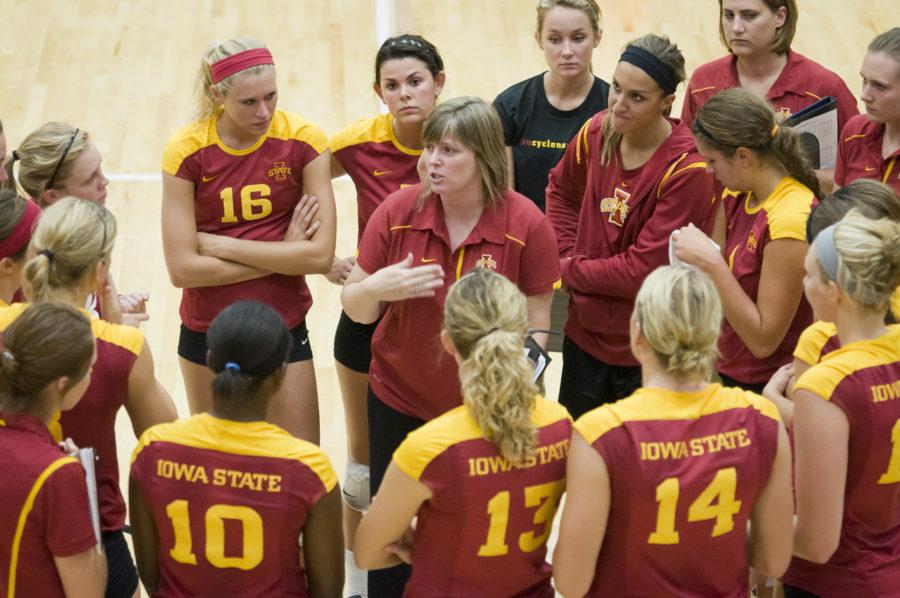Johnson-Lynch finds herself, success at Iowa State: Postseason play
Photo: Logan Gaedke/Iowa State Daily
Coach Christy Johnson-Lynch talks with the team during a time out on Friday, Sept. 3 at Ames High. The Cyclones beat the Bison 3-1.
September 26, 2011
When coach Christy Johnson-Lynch arrived in Ames, the volleyball closet needed a new wardrobe. In the nine seasons before she was hired as head coach, Iowa State had gone a combined 59-212. It had not made the post season since 1995.
While some coaches might shy away from a program that had been toiled in mediocrity for nearly a decade, she saw it as a chance for improvement. She also knew she wasn’t ready for the pressure of taking charge of an already established program.
“This might sound strange, but I thought, because the program had struggled so much, it was a low risk opportunity,” Johnson-Lynch said. “I could go in and probably make them better. I think it’s more difficult, as a first time head coach to step into big shoes.”
Johnson-Lynch lead the Cyclones to a 16-15 record in her first season. They went 9-11 in conference and didn’t make the post season. Still, having a winning record in volleyball was a tremendous step forward for the university.
After taking the job, Johnson-Lynch’s professional life was not the only thing to take a step in the right direction. After being in Ames for only a month, Johnson-Lynch became engaged to volunteer assistant coach Joe Lynch.
The two had met through mutual friends, and Joe was the coach of the top club volleyball team in Milwaukee, Wisc. The two became close and began dating during Johnson-Lynch’s numerous recruiting trips to Milwaukee to scout his players.
While having Joe as a constant support system has helped on a personal level, his volleyball knowledge is underrated.
“He’s one of the best coaches I’ve ever seen,” Johnson-Lynch said. “It’s not just good for me personally. It’s good for the team to have one of the best trainers in the country working with them.”
Johnson-Lynch went through a difficult process to start building the program back up.
“It was incredibly difficult to get things going,” Johnson-Lynch said. “There were many, many 12- and 14-hour days. You put your heart and soul into every thought you have.
“Those were a few long years when you’re doing everything you can to get that right player or think of the right way to train someone. That was exhausting.”
Along with her husband, assistant coach Trudy Vande Berg joined Johnson-Lynch after working together on the staff at Wisconsin. Vande Berg helped train the middle blockers at Wisconsin before taking an assistant coaching job at Duke and reuniting with Johnson-Lynch in Ames.
After coaching with her for so many years, there is a tremendous amount of trust between the two.
“She trusts that you’re going to get your job done,” Vande Berg said. “There’s no looking over your shoulder or anything. She’s also very even keeled. There’s never really any craziness. She’s really good at just leading even on our staff.”
The term ‘bad culture’ is something that often gets attached to programs who go through long periods of losing seasons. TCU football coach Gary Patterson has gotten credit for changing the ‘culture’ in Corpus Christi. James Franklin has been credited with doing the same thing with the Vanderbilt football program.
For Johnson-Lynch, however, it was more about confidence than culture.
“I don’t think it was a bad culture here necessarily,” Johnson-Lynch said. “There were some things confidence-wise that we needed to work on. When I got here, there were a lot of hard-working midwest girls that loved the game of volleyball and really worked hard at it.”
Johnson-Lynch and her staff went to work and recruited aggressively to fill holes and also brought in some transfers that helped out the program. She started with the setter in middle back Erin Boeve.
Boeve’s game reached a new level under Johnson-Lynch. Boeve was an All-Big 12 selection twice during her career at Iowa State. She was also an AVCA All-American honorable mention. She finished with more than 1,000 blocks and 590 total kills.
Joe Lynch knew there was a lot of talent among the players they had when they arrived in Ames. The players were used to losing, however, so the atmosphere needed to be changed.
“I think the most difficult thing was creating a winning atmosphere,” Joe Lynch said. “We just needed to push the players the right way and get them to do the things we wanted them to do.”
Outside her own staff, Johnson-Lynch looked to other ISU coaches for models of success when she first got here. This included ISU women’s basketball coach Bill Fennelly.
Fennelly has put together one of the more successful women’s basketball programs in the country. His teams are perennial contenders in the Big 12 and make the NCAA tournament on a regular basis.
“I think he’s been a tremendous leader,” Johnson-Lynch said. “I really admire his passion and the way he does his job. The crowd and the fan base he has built has been great to see. He’s given me some great advice over the years.”
Johnson-Lynch’s teams advanced farther in post season play each year within her first three years. They finished in the top five in the conference in those three years.
By the end of her third season, Johnson-Lynch finally began to feel comfortable and confident. Those traits carried through to her players and the program continued to rise.







